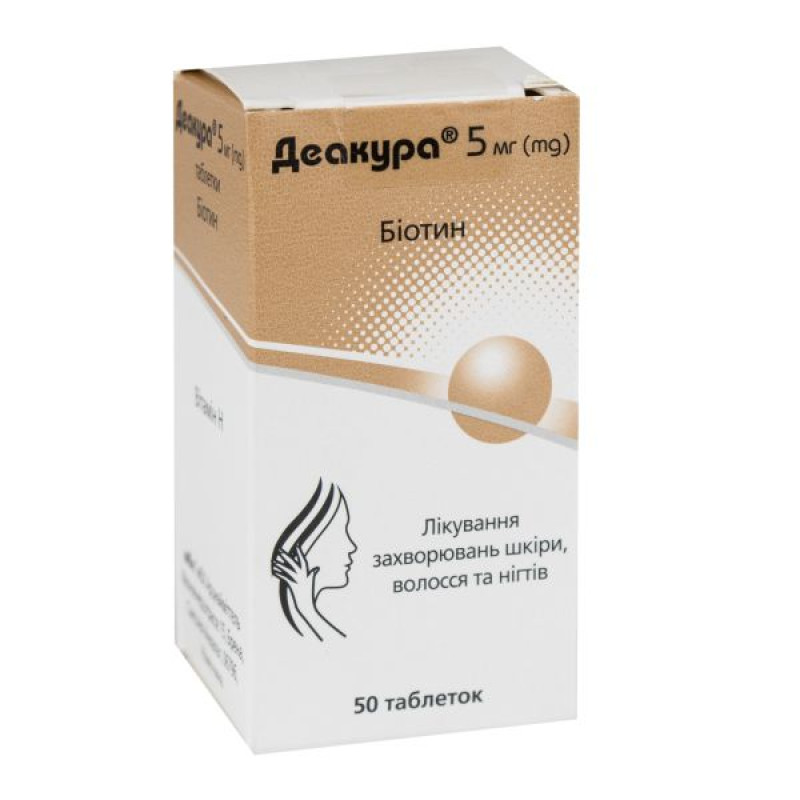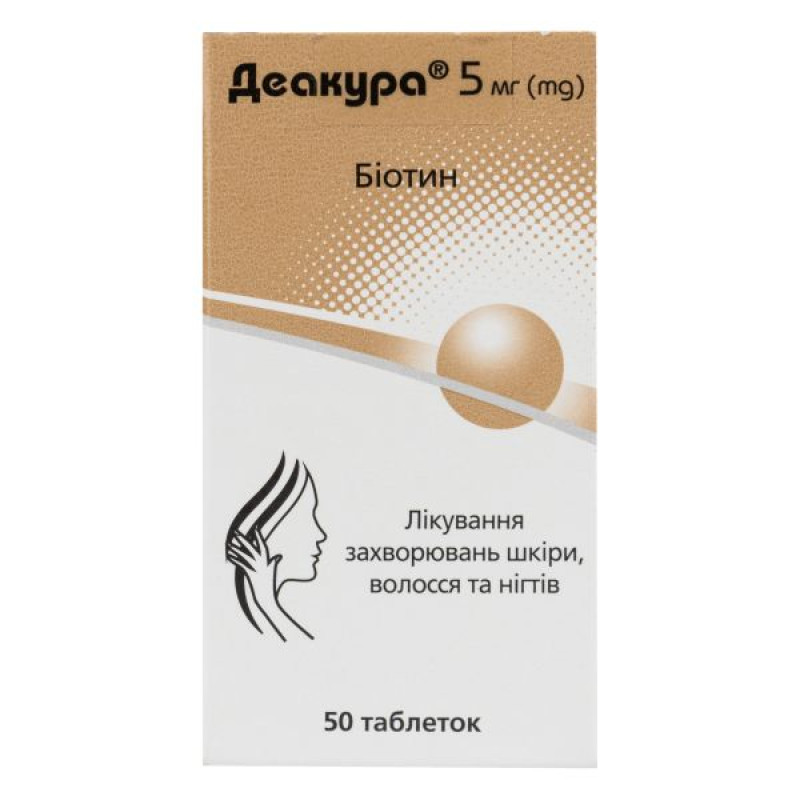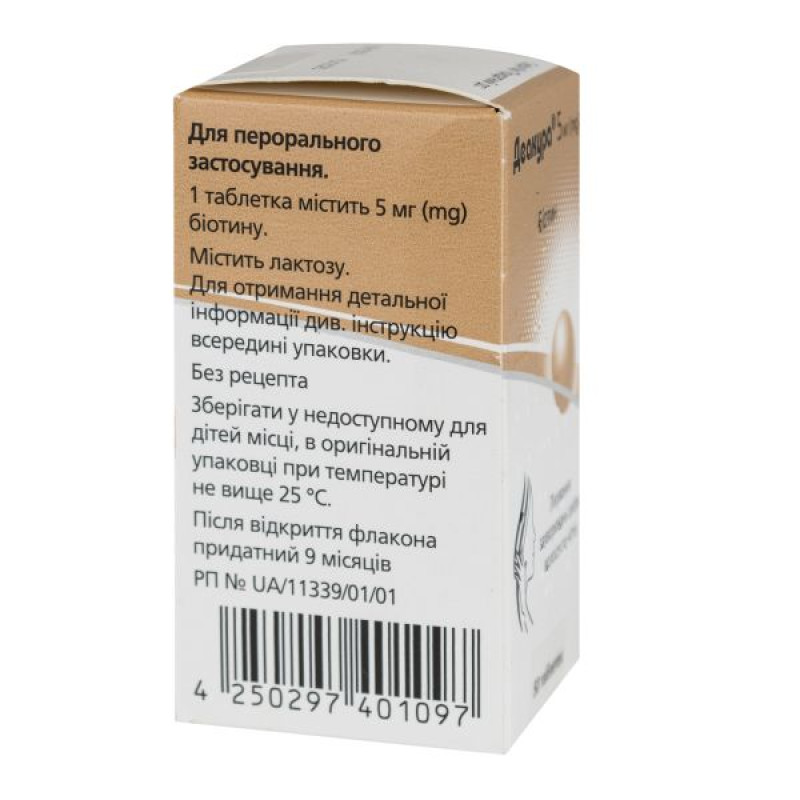Deakura tablets 5 mg bottle #50

Instructions for Deakura tablets 5 mg bottle No. 50
Composition
active ingredient: biotin;
1 tablet contains 2.5 mg or 5 mg of biotin;
Excipients: lactose monohydrate, microcrystalline cellulose, povidone, crospovidone, magnesium stearate.
Dosage form
Pills.
Main physicochemical properties: white, round, flat on both sides tablets with a beveled edge and a cross-shaped dividing line on one side.
Pharmacotherapeutic group
Simple vitamin preparations. Biotin.
ATX code A11H A05.
Pharmacological properties
Pharmacodynamics.
Biotin (vitamin H, vitamin B7) is vital for cell development and growth. As a coenzyme, it plays an important role in gluconeogenesis, lipogenesis, propionate biotransformation, and leucine breakdown.
Biotin deficiency can occur with an unbalanced diet, long-term diets and the use of raw egg white; with parenteral nutrition; with malabsorption syndrome, after resection of the small intestine; with biotin-associated multiple carboxylase deficiency; in patients on hemodialysis.
Biotin is a synergist of other B vitamins. It acts as a coenzyme of carboxylases, has an insulin-like effect and participates in the process of gluconeogenesis (due to participation in the synthesis of glucokinase), as a result of which it helps stabilize blood sugar levels and improves the function of the nervous system. There is evidence of biotin's participation in the synthesis of purine nucleotides. Biotin is also a source of sulfur, which participates in the synthesis of protein - collagen, and thus has a positive effect on the structure of the skin and its appendages (hair, nails).
Pharmacokinetics.
Absorption of free biotin begins in the upper part of the small intestine. Here, the biotin molecule penetrates the intestinal wall unchanged. Absorption occurs mainly by diffusion.
The degree of binding of biotin to blood plasma proteins is 80%.
The concentration of free or weakly bound biotin in the blood is usually from 200 to 1200 μg/l. Biotin is excreted in the urine (from 6 to 50 μg per day) and feces in unchanged form (almost 50%) and in the form of biologically inert metabolites. The half-life depends on the dose administered and is almost 26 hours after internal administration at a dose of 100 μg/kg of body weight. In patients with biotinidase deficiency, the half-life after the same dose is reduced to 10-14 hours.
Indication
Treatment and prevention of diseases caused by biotin deficiency: skin, nail, and hair diseases.
Treatment of genetically determined biotin-associated enzymopathies (multiple carboxylase deficiencies).
Contraindication
Hypersensitivity to biotin or to other components of the drug.
Interaction with other medicinal products and other types of interactions
When used with anticonvulsants, a decrease in plasma biotin levels may occur due to increased urinary excretion. Valproic acid reduces biotinidase activity, reducing mitochondrial function in the liver.
Pantothenic acid in large doses competes with biotin, so their simultaneous use should be avoided.
Application features
Raw egg white contains the protein avidin, which interacts with biotin, so you should avoid taking them together.
Eating a large amount of raw eggs for 2-3 weeks can cause biotin deficiency.
The drug contains lactose, therefore patients with rare hereditary forms of galactose intolerance, lactase deficiency or glucose-galactose malabsorption syndrome should not use the drug.
Use during pregnancy or breastfeeding
There is no experience with the use of the drug during pregnancy and breastfeeding.
The ability to influence the speed of reactions when driving vehicles or other mechanisms
No effect.
Method of administration and doses
The recommended dose for adults in the treatment of biotin deficiency (diseases of nails, hair, skin) is 2.5-5 mg of biotin per day.
For the treatment of genetically determined enzymopathies associated with biotin (multiple carboxylase deficiency), up to 10 mg of biotin per day is prescribed.
Take the tablets before meals, without chewing, with sufficient liquid.
The duration of the treatment course depends on the nature and course of the disease.
Children
There are no data on use in children.
Overdose
There are currently no reports of biotin overdose.
Adverse reactions
Immune system: allergic reactions, including chest pain, shortness of breath, urticaria, skin rashes.
If any adverse reactions occur, it is recommended to discontinue treatment and consult a doctor.
Expiration date
3 years.
After opening the bottle – 9 months.
Storage conditions
Store out of the reach of children, in the original packaging at a temperature not exceeding 25 ºС.
Packaging
Glass bottle of 50 or 100 tablets in a cardboard pack with instructions for medical use.
Vacation category
Without a prescription.
Producer
mibe GmbH Arcnaymittel.
Location of the manufacturer and its business address
Münchenerstrasse 15, 06796 Brena, Germany.
Applicant
Dermapharm AG, Germany.
Location of the applicant's representative
LLC "Mibe Ukraine" 01024, Kyiv, Chekistiv Lane 2A, Ukraine.
There are no reviews for this product.
There are no reviews for this product, be the first to leave your review.
No questions about this product, be the first and ask your question.











